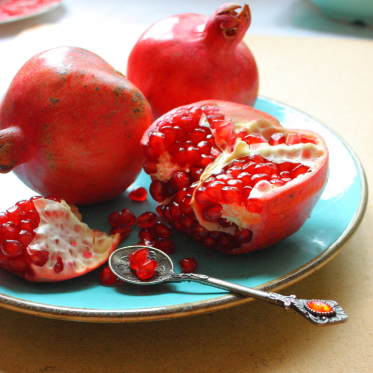Certainly! Pomegranates are not only delicious but also packed with a variety of nutrients that offer numerous health benefits. Here’s a detailed breakdown of the nutritional content found in pomegranate fruit:
Nutritional Content of Pomegranate
Basic Information
- Scientific Name: Punica granatum
- Common Name: Pomegranate
- Serving Size: 1 medium pomegranate (about 282 grams)
Macronutrients
- Calories: 234 kcal
- Carbohydrates: 52.7 grams
- Fiber: 11.3 grams
- Sugars: 38.6 grams
- Protein: 4.7 grams
- Fats: 1.6 grams
Vitamins
- Vitamin C: 28.8 mg (48% of the Daily Value, DV)
- Vitamin K: 46.2 mcg (58% of the DV)
- Vitamin E: 1.7 mg (11% of the DV)
- Vitamin B6 (Pyridoxine): 0.8 mg (47% of the DV)
- Thiamin (B1): 0.1 mg (7% of the DV)
- Riboflavin (B2): 0.1 mg (6% of the DV)
- Niacin (B3): 1.7 mg (11% of the DV)
- Folate (B9): 57.4 mcg (14% of the DV)
Minerals
- Potassium: 665 mg (19% of the DV)
- Phosphorus: 80.6 mg (8% of the DV)
- Magnesium: 12.1 mg (3% of the DV)
- Calcium: 20.7 mg (2% of the DV)
- Iron: 0.8 mg (4% of the DV)
- Zinc: 0.4 mg (3% of the DV)
- Copper: 0.4 mg (20% of the DV)
- Manganese: 0.7 mg (35% of the DV)
Antioxidants and Phytochemicals
- Antioxidants: Pomegranates are rich in antioxidants, particularly punicalagins and punicic acid, which are found in the fruit’s arils (seeds) and juice.
- Polyphenols: High levels of polyphenols, including tannins and anthocyanins, contribute to the fruit’s antioxidant properties.
- Flavonoids: Pomegranates contain flavonoids like quercetin and kaempferol, which have anti-inflammatory and anti-cancer properties.
Health Benefits
- Heart Health:
- The antioxidants in pomegranates can help reduce oxidative stress and inflammation, which are risk factors for heart disease.
- Punicic acid, a type of conjugated linoleic acid, may help lower triglycerides and improve cholesterol levels.
- Anti-Inflammatory Properties:
- Pomegranates contain compounds that can help reduce inflammation in the body, which is linked to various chronic diseases.
- Cancer Prevention:
- The high levels of antioxidants and anti-inflammatory compounds in pomegranates may help prevent the growth of cancer cells and reduce the risk of certain cancers, such as prostate and breast cancer.
- Digestive Health:
- The fiber content in pomegranates can aid in digestion and promote a healthy gut.
- Immune Support:
- Vitamin C and other antioxidants in pomegranates can boost the immune system and help fight off infections.
- Skin Health:
- The antioxidants and vitamins in pomegranates can help protect the skin from damage and promote a healthy complexion.
- Joint Health:
- Pomegranate extract has been shown to have potential benefits for joint health, including reducing symptoms of arthritis.
Example Nutritional Breakdown per 100 grams
- Calories: 83 kcal
- Carbohydrates: 18.7 grams
- Fiber: 4 grams
- Sugars: 13.7 grams
- Protein: 1.7 grams
- Fats: 0.6 grams
- Vitamin C: 10.2 mg (17% of the DV)
- Vitamin K: 16.4 mcg (20% of the DV)
- Potassium: 236 mg (7% of the DV)
- Folate: 20.2 mcg (5% of the DV)
Conclusion
Pomegranates are a nutrient-dense fruit that offers a wide range of health benefits. Their high content of antioxidants, vitamins, and minerals makes them an excellent addition to a balanced diet. Whether you are looking to improve heart health, reduce inflammation, or boost your immune system, pomegranates can be a valuable part of your nutritional plan.









